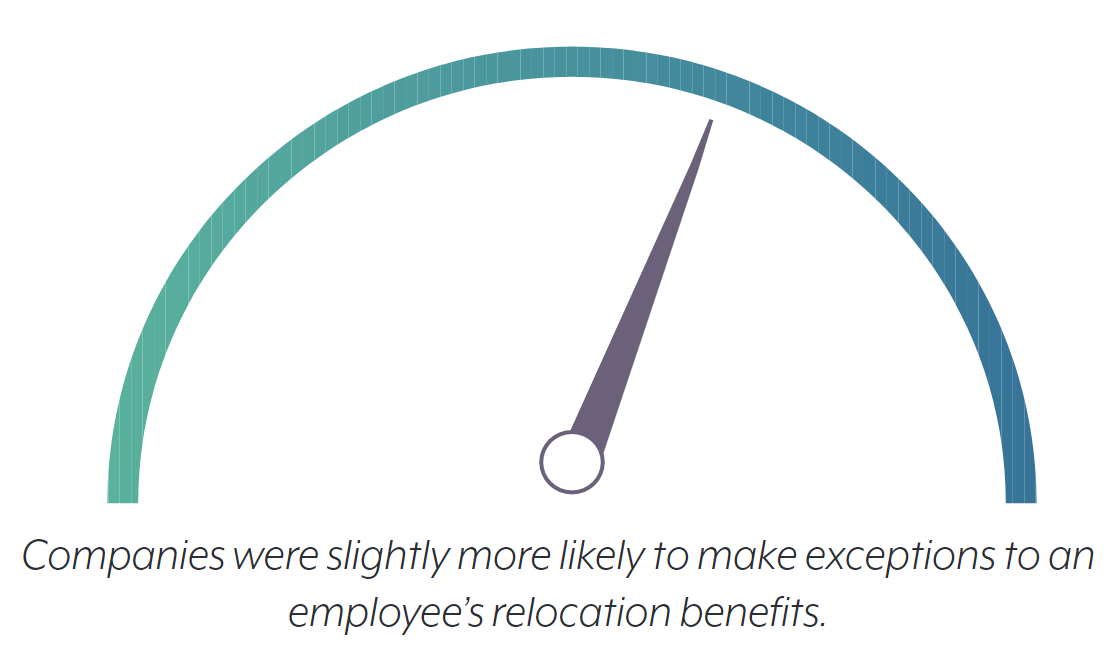Egal, wie detailliert und umfassend Ihre Richtlinien für das Umzugsmanagement sind, manchmal stoßen Sie auf Ausnahmen oder Sonderwünsche Ihrer Mitarbeiter. Dazu kann es gehören, dass sie ihre Kinder auf Wohnungssuche mitnehmen möchten, einen zusätzlichen Monat in einer vorübergehenden Unterkunft benötigen, ein Haustier mitnehmen oder um eine Verlängerung der Lagerzeit für Hausrat bitten. Umzugspakete und andere Umzugsleistungen können sehr unterschiedlich ausfallen.
Vor und während des Umzugsprozesses treten einzigartige Umstände auf. Es ist unvermeidlich, dass Unterstützung bei der Umsiedlung benötigt wird. Deshalb lassen die meisten Unternehmen Ausnahmen von ihren Richtlinien zu.
Unsere Mobilitäts- und Kultur-Benchmarkstudie 2018 hat ergeben, dass nur 28 % der Unternehmen der Ansicht sind, dass sie über flexible, leicht anpassbare Umzugspakete verfügen. Die verbleibenden 72 % neigen dazu, sich eng an ihre umrissenen Programme zu halten. Auch wenn die meisten Unternehmen ihre Umzugsprogramme konsequent umsetzen, gaben 64 % an, dass sie eher Ausnahmen von ihren Richtlinien für umziehende Mitarbeiter machen würden.

Das Ausnahmemanagement ist ein wesentlicher Bestandteil des Umzugsprogramms eines jeden Unternehmens. Die Richtlinien werden erstellt, um die Bedürfnisse der meisten umziehenden Mitarbeiter zu berücksichtigen, aber keine zwei Umzüge sind gleich.
1. Erwartungsmanagement minimiert Ausnahmen
Vor der Einstellung eines neuen Mitarbeiters oder der Versetzung eines bestehenden Mitarbeiters ist es wichtig, die Erwartungen zwischen Ihnen, Ihrer Relocation Management Company (RMC) und Ihrem Mitarbeiter gründlich zu prüfen und zu verstehen. Ein proaktives Herangehen an die besonderen Bedürfnisse und Anliegen Ihrer Mitarbeiter ist der effektivste Weg, um mit Ausnahmen umzugehen. Ihr RMC sollte sich auch ausreichend Zeit nehmen, um die geltenden Richtlinien mit dem versetzenden Mitarbeiter zu besprechen, damit dessen Erwartungen mit den Parametern Ihres Programms übereinstimmen. Die Zeit, die Sie in den Umgang mit den Erwartungen investieren, ist gut angelegt, denn sie führt zu weniger Ausnahmen von den Richtlinien. Wichtige Überlegungen betreffen die Unterstützung bei der Versetzung, Umzugsbeihilfen und eine mögliche Rückerstattung der Umzugskosten.
2. Seien Sie realistisch, sachkundig und flexibel
Wissen ist alles im Relocation-Prozess. In der Umfrage zu Mobilität und Kultur haben wir die Befragten gebeten, die häufigsten Ausnahmen zu nennen, die sie machen. Hier ist, was wir gefunden haben:
%
Temporäre Unterkünfte
%
Nutzen/Zeitrahmenverlängerung
%
Zusätzliche Dienstleistungen im Bereich Hausrat
%
Lagerung von Haushaltswaren
%
Zusätzliche Zulagen
Die Kenntnis der häufigsten Umzugsausnahmen kann Ihnen helfen, sich auf künftige Umzüge vorzubereiten. Sie werden realistischer sein, wenn es darum geht, was Sie genehmigen, und flexibler in dem, was Sie anbieten.
3. Vorbereitung auf unvorhergesehene Umzugsereignisse
Niemand kann alle möglichen Folgen einer Übertragung vorhersagen. Was ist, wenn die alten Hausbesitzer nicht in der Lage sind, ihr neues Haus so schnell wie erwartet abzuschließen? Was ist, wenn der Hausrat monatelang durch den Zoll aufgehalten wird? Die meisten Versicherungspolicen für Arbeitnehmerübergänge decken solche Fälle nicht ab, weil sie so selten vorkommen.
Sollte jedoch etwas Unvorhergesehenes passieren, muss Ihr RMC in der Lage sein, sich schnell anzupassen und die Situation zu bewältigen. Eine Verzögerung der Schließung könnte eine zusätzliche vorübergehende Unterbringung bedeuten, und eine zusätzliche vorübergehende Unterbringung könnte eine zusätzliche Lagerung von Hausrat bedeuten. Das Ziel des Umzugsausnahmemanagements besteht darin, proaktiv zu sein und die Bedürfnisse der Mitarbeiter zu antizipieren, noch bevor diese selbst wissen, was sie brauchen. Sprechen Sie unbedingt mit Ihrem RMC über einige dieser möglichen Umzugssituationen und wie sie gehandhabt werden.
4. Verfolgung und Berichterstattung
Nur 64 % der Unternehmen, die Ausnahmen von ihren Richtlinien zulassen, setzen Technologien zur Nachverfolgung ein. Die Möglichkeit, Ausnahmen, auch solche, die vor der Versetzung genehmigt wurden, zu verfolgen und zu melden, gibt Ihrem Unternehmen eine Grundlage für realistische Kostenerwartungen. Auf diese Weise können Sie auch die Kosten für künftige Anträge auf Ausnahmen bei Umzügen abschätzen und die Richtlinien entsprechend ändern.
5. Verbesserung der Politik der Umzugsausnahmen
Wir sind der Meinung (und haben es in unserer eigenen Arbeit gesehen), dass eine genaue Beobachtung der Trends bei den Ausnahmen von Umzugspaketen in Ihrem Programm die Möglichkeit bietet, die Richtlinien zu überarbeiten und Ihnen so die zeitraubende Aufgabe zu ersparen, dieselbe Ausnahme mehrmals zu bearbeiten. Wir haben jedoch festgestellt, dass nur 62 % der Unternehmen Änderungen an ihren Umzugspaketrichtlinien auf der Grundlage von Ausnahmen vornehmen. Empfehlungen und Verbesserungen der Richtlinien sollten von Ihrem Umzugsunternehmen laufend vorgenommen werden. Dies wird Ihnen letztlich helfen, die Kosten zu kontrollieren und Ihre besten Mitarbeiter anzuziehen und zu halten.

